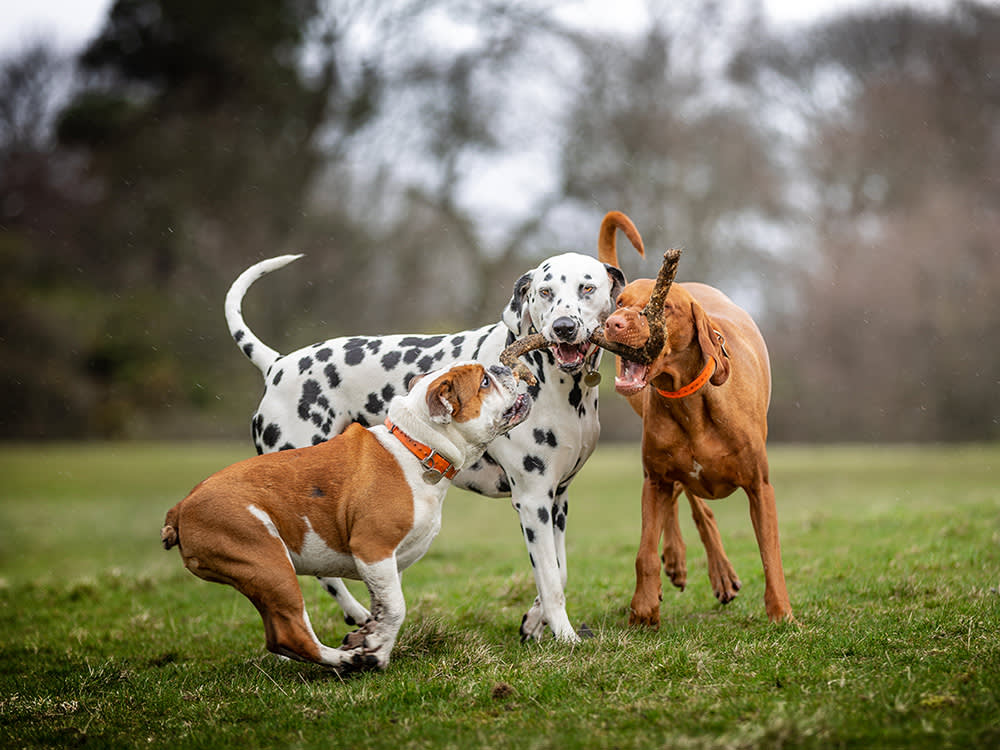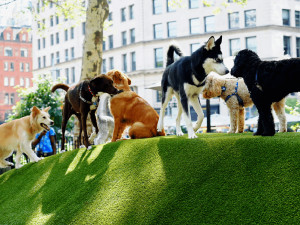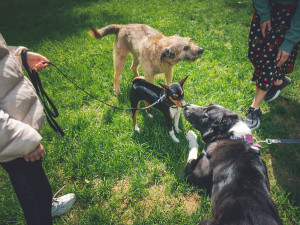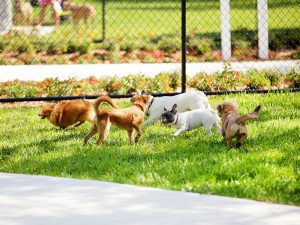Are Dog Parks Good for Socialization?
Help! Should I take my young dog to the dog park for “socialization”?

Share Article
My husband and I are having a disagreement. He wants to take our two-year-old dog to the dog park for socialization because we don’t want her to become rusty at getting along with other dogs. But I have read that you can only socialize puppies—that it doesn’t work for adult dogs. Can dogs of all ages be socialized? Should we take our dog to the dog park?
In the world of canine behavior, the word “socialize” has a specific technical meaning (which I’ll address shortly), but it is also commonly used to describe another activity: to engage in social interactions. The latter is what your husband seeks for your dog at the dog park. As long as she enjoys other dogs and can play appropriately with them, she is a good candidate for visits there. There are a few caveats.

littleKin™ is Kinship’s home just for puppy and kitten parents. Bop over to check out expert advice, new pet tools, and special deals—all curated for your newest family member.
opens in a new tabDog Park Socials vs. Socializing a Puppy
Make sure that the dog park is one where people are responsible for the dogs they bring and about monitoring behavior, and that there is enough room for dogs to romp and play without feeling cornered by the crowd. My favorite dog parksopens in a new tab have many acres, trails for walking and open areas for playing. Smaller parks can work as long as they are not too small for the dogs to spread out a bit and run around. But, socializing a puppy and providing an adult dog with a social life are two different things.
Positive Puppy Socialization Experiences
To socialize means to expose a puppy to a variety of new experiences during a critical period of their lives. The critical period in puppies is from about three to 14 weeks of age; during that time, dogs are particularly receptive to learning that new things are not scary. It is much harder for them to learn to feel comfortable about new things later on in life.
A good analogy is learning a language. When we learn a language as young children, we do it well and we do it thoroughly. Once we are beyond childhood, we can learn languages, but rarely can we learn them as well and with as little effort. The goal of socializing puppiesopens in a new tab is to help them reach a point where they have the social skills necessary to engage with other dogs, people and perhaps catsopens in a new tab.
We also want them to be able to handle cars, bikes, skateboardersopens in a new tab, shopping carts, musical instruments, the TVopens in a new tab, the sound of phones and alarms, and so much more—all things that they will encounter throughout their lives. We want them to be as fluent in daily life as we are in our first language.
The critical period is also called the sensitive period, and dogs are very sensitive to the experiences they have at this age. Good experiences make it likely that they will easily accept those things throughout life, but bad experiences can be traumatic and especially hard to get over. Positive experiences are the goal when socializing a puppy, so the focus should be on quality (exposing the puppy to new things in pleasant ways) rather than focusing on quantity (exposing the puppy to as many things as possible, no matter how overwhelming such experiences may be).
Dog Parks Aren’t for Puppies
It’s easy to overwhelm puppies, which is one of the reasons I don’t like puppies to go to the dog park. It’s far too likely that another dog will overdo it (perhaps aggressively, but more commonly due to an overabundance of exuberance) and scare or overwhelm the puppy, setting up a young dog for a life of concern about other dogs. Dog parks are better for dogs once they are past the puppy stage, but puppies can and should have play dates with very small groups of sociable dogs who play appropriately.
Only puppies can be socialized in the technical sense, but adult dogs can benefit from social interaction. Not all dogs need to be around other dogs or benefit from being social in the general sense, but many do. It’s great for dogs who like other dogs and can play appropriately to spend time at the dog park, as long as it is one where people behave responsibly and there’s enough space.

Karen B. London, PhD, CAAB, CPDT-KA
Karen B. London, Ph.D., is a Certified Applied Animal Behaviorist and Certified Professional Dog Trainer who specializes in working with dogs with serious behavioral issues, including aggression, and has also trained other animals including cats, birds, snakes, and insects. She writes the animal column for the Arizona Daily Sun and is an Adjunct Professor in the Department of Biological Sciences at Northern Arizona University. She is the author of six books about training and behavior, including her most recent, Treat Everyone Like a Dog: How a Dog Trainer’s World View Can Improve Your Lifeopens in a new tab.
Related articles
 opens in a new tab
opens in a new tabDog Park Etiquette: Dog Park Dos and Don’ts
New kid on the block? Follow this trainer’s tips before letting your pet run wild.

How Do I Get My Shy Dog To Socialize?
Kinship Collective dog trainer Robert Haussmann’s tips for getting a shy pup to go from wallflower to social butterfly.

Can Your Shy New Rescue Dog Become a Social Creature?
With patience and positive reinforcement, you can do a lot to make up for lost time with socialization.
 opens in a new tab
opens in a new tabCreate a Neighborhood Dog Park and Win Over All the Local Pups
The hottest club in your neighborhood is...the dog park.